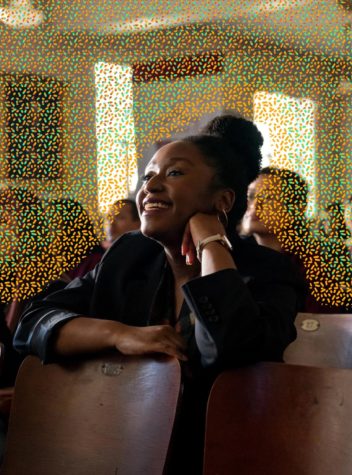Precarious roles: Thea Hunter’s many faces
September 29, 2021

Whenever I return to the story, I fixate on the photograph: a Black woman in her sixties, a white sunhat atop her head, a hand resting on the slope between her cheek and chin, its bend lightly touching her easy smile. At a glance, you may see a familiar face — a mother, an aunt, a friend, a person you only come upon in passing yet a kinship is nonetheless present.
As I journey the Atlantic article, I witness the too-soon-gone life of Thea Hunter, a woman whose personality matched the loving easiness of her photograph. Reaching toward a career as a historian, Hunter shouldered a love, light and care so troublesome to find in the walls of academia. Needless to say, her work was imbued with these effects.
“Thea was a breath of fresh air,” Jim Downs, a professor of history at Connecticut College in the article said. “She had this ability to be extemporaneous and brilliant.”
Despite her tact, Hunter found herself stuck in the precarious role of adjunct professor. “She was on the tenure track, and then she wasn’t. She had a promising job lead, and then it wasn’t so promising. She was on her way to publishing, and then that fizzled,” the article said.
Burdened down by the anti-blackness in the workplace and by the hazy outlook of adjunct professorship, Hunter found herself ailing and bereft of the insurance necessary to ensure her maintenance. She succumbed to heart disease. In a sense, the world she inhabited slowly stripped her life before her time was to end.
My mind remained on Hunter — that beautiful bird-marveller — as I watched Netflix’s new show “The Chair.” I saw the trailer a few months back and was thrilled for the story: Professor Ji-Yoon Kim, played by Sandra Oh, an Asian professor who chairs the English department of Pembroke University.
Entering a department filled with every “ism” in the book as well as bolstering a life of adoptive parenthood and a dim love story, Kim finds herself weary to the point of spontaneous weeping. As an English major and someone aspiring to become an educator, I assumed this story to be a refreshing, new and enticing trip. Aside from a few moments of affectionate grins, amused chuckles and slight head nods, I was left disappointed.
The series was short, comprised of only six 30-minute episodes, and Kim’s brilliance is shadowed by her love story with a professor whose behavior is so outlandish and inconsiderate that it left me to wonder, what was the point of all that? However, my disappointment heightened as the character Yaz McKay made her entrance, a character whose filmic existence is haunted by Thea Hunter’s demise.
A young, Black female academic, McKay initially appears as the glimmering light soon to brighten the academy. Yet with a keen abruptness, the light is dimmed and the supposedly erstwhile disposition of a static academy proves ever-present.
McKay is met with the intimidated spirit of a white senior scholar Elliot Rentz who feels that McKay is disparaging the age-old art of literature. At the behest of Kim, McKay is forced to merge her class with Rentz so that he may be eased. Rentz’s ease results in his advocacy for McKay’s tenure track.
While Hunter and McKay are coming from two vastly different angles — adjunct and tenure track, respectively — their quiet anguish is the same. Each story calls me to present a question: What is to come from the acknowledgement of a Black voice, in this specific case a Black female voice, which speaks the desire, the very need for liberation?
McKay’s character may not be the bluntly stereotypical Black female role we are accustomed to, yet her role is the precarious role acted out by Hunter a few years ago: a Black individual declared a marvelous architect, but only as she constructs the foundations of others. In other words, McKay stands the extracted-from being that so marks the existence of Black people. Her labor and love is never for her nor those she mirrors.
What would have happened if Hunter was a scholar in a world not bent on her genuflection? How wouldMcKay’s character have been shifted if she was not called to bend? This question begs repeating: What is to come from the acknowledgement of a Black voice which speaks the language of freedom? Perhaps, the world is not ready for such an amazement. And, perhaps, its readiness is not needed.









Leave a Comment